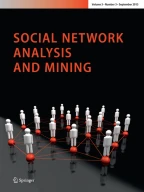Abstract
Quora is a fast growing social Q&A site where users create and answer questions, and identify the best answers by upvotes and downvotes with crowd wisdom. Unfortunately, little is known about properties of experts and non-experts and how to detect experts in general topics or a specific topic. To fill the gaps, in this manuscript we (1) analyze behaviors of experts and non-experts in five popular topics; (2) propose user activity features, quality of answer features, linguistic features and temporal features to identify distinguishing patterns between experts and non-experts; and (3) develop statistical models based on the features to automatically detect experts. Our experimental results show that our classifiers effectively identify experts in general topics and a specific topic, achieving up to 97 % accuracy and 0.987 AUC.
Similar content being viewed by others
References
Alexa (2015) Quora.com site overview—Alexa. http://www.alexa.com/siteinfo/quora.com
Bouguessa M, Dumoulin B, Wang S (2008) Identifying authoritative actors in question-answering forums: The case of yahoo! answers. In: Proceedings of the 14th ACM SIGKDD international conference on Knowledge discovery and data mining
Fast LA, Funder DC (2008) Personality as manifest in word use: correlations with self-report, acquaintance report, and behavior. J Pers Soc Psychol 94(2):334–346
Furtado A, Oliveira N, Andrade N (2014) A case study of contributor behavior in Q&A site and tags: the importance of prominent profiles in community productivity. J Braz Comput Soc 20(1):5
Gill AJ, Nowson S, Oberlander J (2009) What are they blogging about? personality, topic and motivation in blogs. In: Proceedings of the 3rd International AAAI Conference on Weblogs and Social Media
Hall M, Frank E, Holmes G, Pfahringer B, Reutemann P, Witten IH (2009) The Weka data mining software: an update. SIGKDD Explor Newsl 11(1):10–18
Harper FM, Raban D, Rafaeli S, Konstan JA (2008) Predictors of answer quality in online Q&A sites. In: Proceedings of the SIGCHI Conference on Human Factors in Computing Systems
Jeon J, Croft WB, Lee JH, Park S (2006) A framework to predict the quality of answers with non-textual features. In: Proceedings of the 29th annual international ACM SIGIR conference on Research and development in information retrieval
Jurczyk P, Agichtein E (2007) Discovering authorities in question answer communities by using link analysis. In: Proceedings of the sixteenth ACM conference on Conference on information and knowledge management
Kao WC, Liu DR, Wang SW (2010) Expert finding in question-answering websites: a novel hybrid approach. In: Proceedings of the 2010 ACM Symposium on Applied Computing
Klout (2013) See how it works—Klout. http://klout.com/corp/how-it-works
Liu DR, Chen YH, Kao WC, Wang HW (2013) Integrating expert profile, reputation and link analysis for expert finding in question-answering websites. Inf Process Manag 49(1):312–329
Luo L, Wang F, Zhou MX, Pan Y, Chen H (2014) Who have got answers?: growing the pool of answerers in a smart enterprise social QA system. In: Proceedings of the 19th international conference on Intelligent User Interfaces
Mahmud J, Zhou MX, Megiddo N, Nichols J, Drews C (2013) Recommending targeted strangers from whom to solicit information on social media. In: Proceedings of the 2013 international conference on Intelligent user interfaces
McLaughlin HG (1969) SMOG grading—a new readability formula. J Read 12(8):639–646
Pal A, Farzan R, Konstan JA, Kraut RE (2011) Early detection of potential experts in question answering communities. In: Proceedings of the 19th international conference on User modeling, adaption, and personalization
Pal A, Harper FM, Konstan JA (2012) Exploring question selection bias to identify experts and potential experts in community question answering. ACM Trans Inf Syst 30(2):10:1–10:28
Paul SA, Hong L, Chi EH (2012) Who is authoritative? understanding reputation mechanisms in Quora. In: Collective intelligence
Pennebaker J, Francis M, Booth R (2001) Linguistic inquiry and word count. Erlbaum Publishers, Mahwah
Quora (2014) How are top writers chosen? what are the criteria for being chosen as a top writer? http://www.quora.com/How-are-Top-Writers-chosen-What-are-the-criteria-for-being-chosen-as-a-Top-Writer
Riloff E, Wiebe J (2003) Learning extraction patterns for subjective expressions. In: Proceedings of the conference on empirical methods in natural language processing
Schall D, Skopik F (2011) An analysis of the structure and dynamics of large-scale q/a communities. In: Proceedings of the 15th international conference on advances in databases and information systems (ADBIS)
Song S, Tian Y, Han W, Que X, Wang W (2013) Leading users detecting model in professional community question answering services. In: Proceedings of International Conference on Green Computing and Communications and Internet of Things and Cyber, Physical and Social Computing
Su Q, Pavlov D, Chow JH, Baker WC (2007) Internet-scale collection of human-reviewed data. In: Proceedings of the 16th international conference on World Wide Web
Toba H, Ming ZY, Adriani M, Chua TS (2014) Discovering high quality answers in community question answering archives using a hierarchy of classifiers. Inf Sci 261:101–115
Wang G, Gill K, Mohanlal M, Zheng H, Zhao BY (2013) Wisdom in the social crowd: an analysis of Quora. In: Proceedings of the 22nd international conference on World Wide Web
Yang Y, Pedersen JO (1997) A comparative study on feature selection in text categorization. In: Proceedings of the Fourteenth International Conference on Machine Learning
Zhang J, Ackerman MS, Adamic L (2007) Expertise networks in online communities: structure and algorithms. In: Proceedings of the 16th international conference on World Wide Web
Zhou G, Liu K, Zhao J (2012) Joint relevance and answer quality learning for question routing in community QA. In: Proceedings of the 21st ACM international conference on Information and knowledge management
Zhou G, Zhao J, He T, Wu W (2014) An empirical study of topic-sensitive probabilistic model for expert finding in question answer communities. Knowl Based Syst 66:136–145
Zhu Z, Bernhard D, Gurevych I (2009) A multi-dimensional model for assessing the quality of answers in social Q&A sites. In: Proceedings of 14th International Conference on Information Quality
Author information
Authors and Affiliations
Corresponding author
Rights and permissions
About this article
Cite this article
Patil, S., Lee, K. Detecting experts on Quora: by their activity, quality of answers, linguistic characteristics and temporal behaviors. Soc. Netw. Anal. Min. 6, 5 (2016). https://doi.org/10.1007/s13278-015-0313-x
Received:
Revised:
Accepted:
Published:
DOI: https://doi.org/10.1007/s13278-015-0313-x
